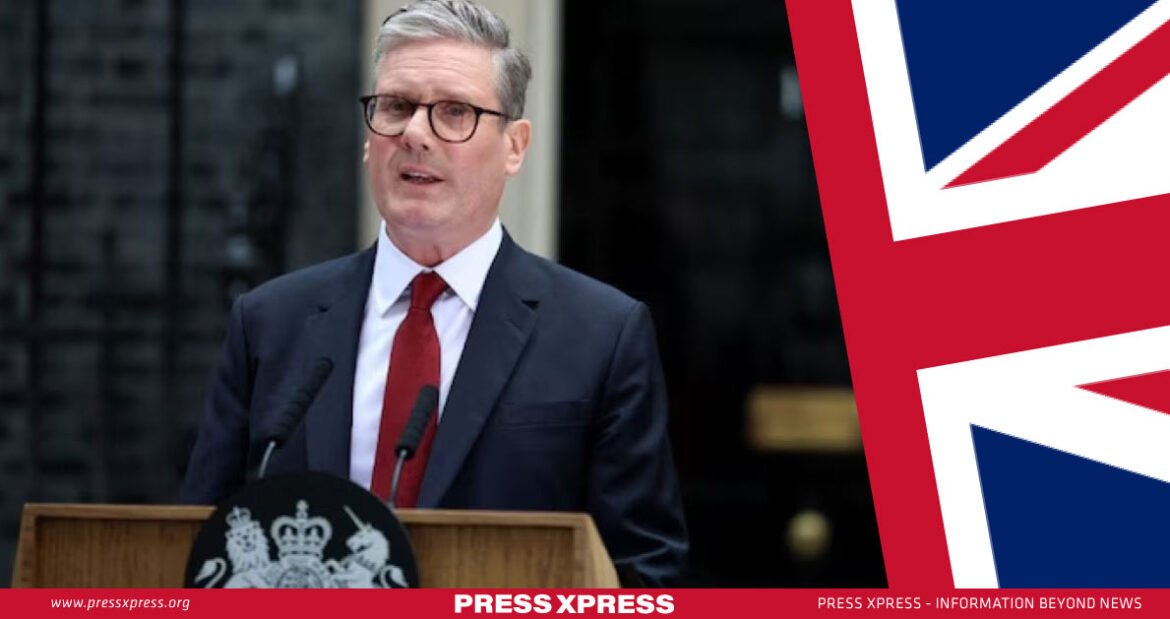Key Highlights:
- Labor has won the election by a landslide. Sir Keir Starmer, the incoming prime minister, says promised changes will begin imminently.
- Rishi Sunak has congratulated his rival and is expected to formally tender his resignation to the King soon.
- Former PM Liz Truss has lost her seat, joining other big-name casualties including Penny Mordaunt, Grant Shapps, and Jacob Rees-Mogg.
All’s well that ends well! After weeks of hectic campaigning, it’s finally over. Rishi Sunak submitted his resignation to King Charles III at Buckingham Palace yesterday and Downing Street has welcomed its new ‘Starmerizing’ Prime Minister after 14 years of Tory rule.
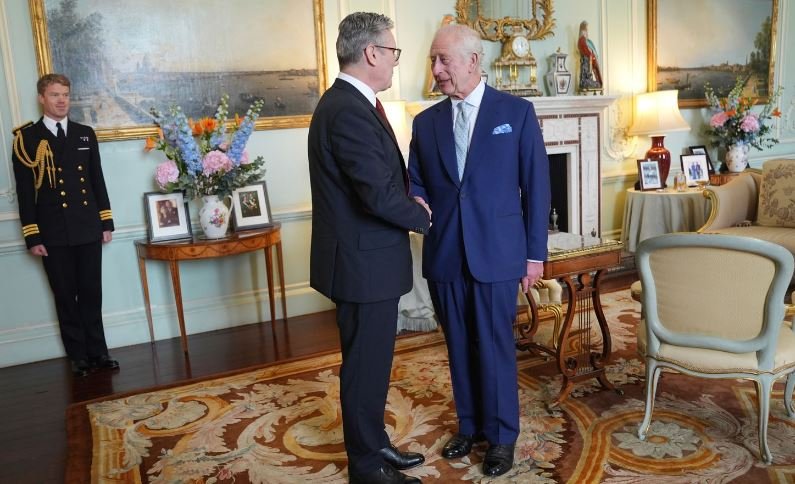
Accepting responsibility for the Conservative Party’s crushing defeat, Sunak delivered a somber speech on his way out of Downing Street. His final address as Prime Minister comes 44 days after he called a general election in the same spot, amidst pouring rain, with Labor’s 1997 election anthem blaring in the background.
Check out: Who is Keir Starmer, The Elusive Politician?
Sir Keir Starmer declared, ‘Change begins now’, as he prepares to enter Downing Street with one of the largest Commons majorities in history.
To rapturous applause, the Labor leader delivered his victory speech after the party officially reached the 326-seat mark required to govern with a majority. He exclaimed, “We did it! You campaigned for it, you fought for it, you voted for it, and now it has arrived.”
The Labor Party has won 412 seats, representing a majority of around 170. Prominent Tories like Liz Truss, Penny Mordaunt, Grant Shapps, and Jacob Rees-Mogg are among those who have lost their seats.
The Liberal Democrats have won 71 seats, with Reform UK, the Green Party, the Scottish National Party (SNP), and Plaid Cymru each securing a handful.

Labor’s Landslide: Big Win, Bigger Challenges Ahead
The projected 170-seat majority for Labor in the House of Commons is substantial but falls short of the 179-seat majority achieved by Tony Blair’s party in the 1997 election. However, Labor’s potential large majority may hinge on a narrow portion of the electorate, with the right-of-center vote divided between the Conservatives and Reform, while the Liberal Democrats have also shown strength.
This scenario carries a cautionary note: if Keir Starmer fails to deliver on his promises of improvement, public sentiment could quickly turn against him in a politically volatile climate. In turbulent times, anti-incumbency sentiments often prevail, highlighting the volatile nature of British politics.
Nonetheless, despite any reservations, a landslide victory remains just that—a landslide.
What Was the Voter Turnout?
The voter turnout for this year’s election is 59.9% a significant decrease from the 67% turnout in 2019. Several constituencies across the UK experienced voter turnouts of around 50%, with some even as low as 40%, which is exceptionally low.
You Can Also Read: UK Election: Keir Starmer’s Historic Win in landslide Victory
In Hull East, the turnout was 42.3%, Smethwick saw 48%, Tipton and Wednesbury had 43%, and West Bromwich recorded 49%.
In Keir Starmer’s constituency of Holborn and St Pancras, the estimated turnout was 54.6%, down more than 10% from the last election. Additionally, only 53% of the electorate turned out to vote for Richard Tice as the Reform UK MP for Boston and Skegness.
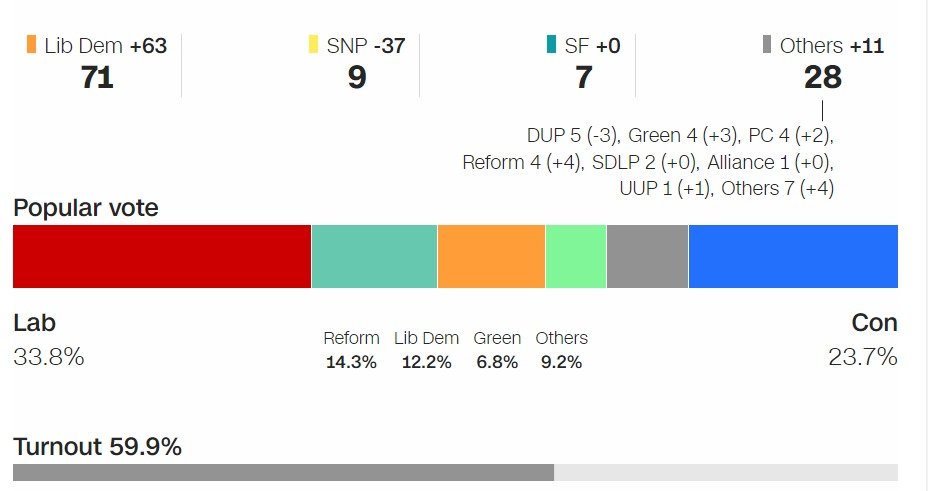
London Bridge Has Fallen Down for The Conservatives
The Conservatives face a devastating outcome as voters have expressed their discontent after enduring 14 years of austerity measures, managing Brexit, navigating through a pandemic, handling political scandals, and dealing with internal conflicts.
In a stunning turn of events, former Prime Minister Liz Truss and Defense Minister Grant Shapps were among a record number of senior ministers to lose their parliamentary seats, as the governing Conservative Party was ousted from power in Britain’s election.
Penny Mordaunt, leader of the lower house of parliament and considered a potential future Conservative leader, was another of the 12 senior ministers voted out, surpassing the previous record of seven set in 1997 when Tony Blair’s Labor Party achieved a landslide victory.
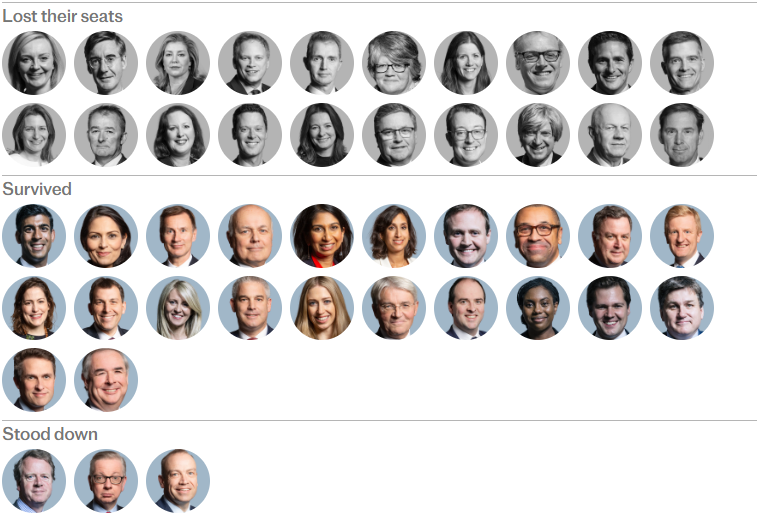
Nigel Farage Finally Lands in Parliament
Reform UK’s Nigel Farage clinched victory in Clacton, marking his 8th attempt to secure a parliamentary seat. Despite the party’s initial forecast of 13 seats falling short of 4, this achievement surpasses the performance of both The UK Independence Party and the Brexit Party.
Mr. Farage is jubilant amidst these results, with the party garnering an estimated 14% share of the vote.
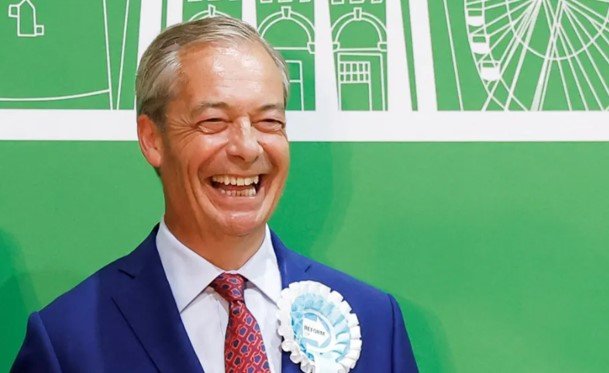
Lib Dems Seize Cameron and May’s Former Seats
The Liberal Democrats have achieved a historic victory, making significant inroads into traditional Conservative strongholds. They notably secured seats once held by former prime ministers David Cameron and Theresa May, emblematic of deep-seated discontent among longstanding Conservative supporters.
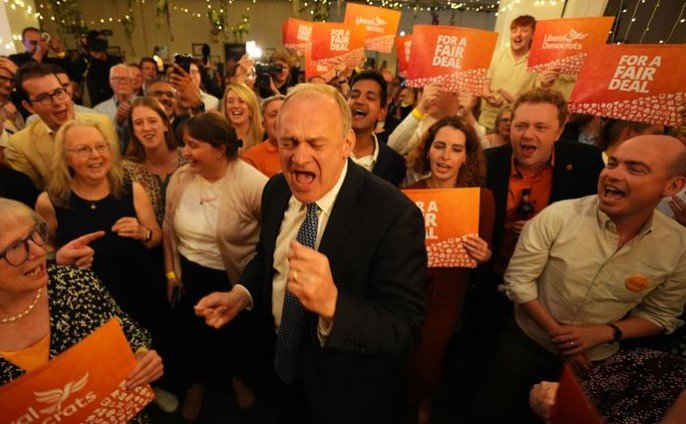
This success stems from a strategic approach honed long before the election was called: targeting constituencies where they had previously been strong contenders, rather than focusing solely on national vote share. Despite maintaining a stable overall vote share of around 12%, down from their peak of 23% during the coalition government of 2010, Ed Davey now leads a party boasting a record number of MPs.
Bangladeshi-British Women Secure Labor Strongholds
Several Bangladeshi-origin MPs have been successfully re-elected to continue their roles as representatives in the UK Parliament, all representing the Labor Party.

- Rushanara Ali has secured re-election in Bethnal Green and Bow with 34.1% of the vote, maintaining her seat since 2010.
- Rupa Huq, representing Ealing Central and Acton, achieved 46.8% of the vote and has been serving since 2015.
- Tulip Siddiq has been re-elected in Hampstead and Kilburn with 48.3% of the vote, continuing as an MP since 2015.
- Apsana Begum, who first became an MP in 2019, has been re-elected in Poplar and Limehouse with 43.1% of the vote.
Nationalists Top Westminster Seats in Northern Ireland
Sinn Féin has achieved a significant milestone in the Westminster parliament, emerging as Northern Ireland’s largest party following a groundbreaking performance in the UK general election. The nationalist Sinn Féin, known for its stance on reunifying Northern Ireland with the Republic of Ireland, secured 7 seats out of the available 18 in Westminster.
Meanwhile, the Democratic Unionist Party (DUP), the foremost Unionist party advocating for Northern Ireland to stay within the United Kingdom, garnered a total of 5 seats but faced losses in some traditionally strong constituencies.
Gaza Conflict Propels 5 Independents to Victory
5 independent candidates advocating for Palestine, including former Labor Party leader Jeremy Corbyn, emerged victorious. The conflict in Gaza was a pivotal issue for voters. Corbyn, 75, secured his re-election in London’s Islington North constituency, a seat he has held for over 40 years, defeating Labor’s Praful Nargund with 24,120 votes against 16,873.
4 other independents who triumphed over Labor candidates:
- Shockat Adam in Leicester South
- Ayoub Khan in Birmingham Perry Barr
- Adnan Hussain in Blackburn, and
- Iqbal Mohamed in Dewsbury and Batley.
SNP’s Westminster Dominance Ends
The SNP faces a critical 18-month window to revive the case for Scottish independence following a significant setback in the general election, conceded Westminster leader Stephen Flynn. Losing 38 of their 47 seats, primarily to a resurgent Labor, the nationalists relinquished their position as Scotland’s leading party in the House of Commons.
This defeat deals a severe blow to their aspirations for another independence referendum. Labor’s unexpected gain of 36 seats, fueled by a 35.7% share of the Scottish vote—several points higher than the national average—has stunned SNP leaders and caught Labor strategists off guard.
With Labor’s Victory, Rishi Sunak’s bid for Tory leadership has begun in earnest. Now it’s time to see which direction will Starmer take for Britain’s Future.

